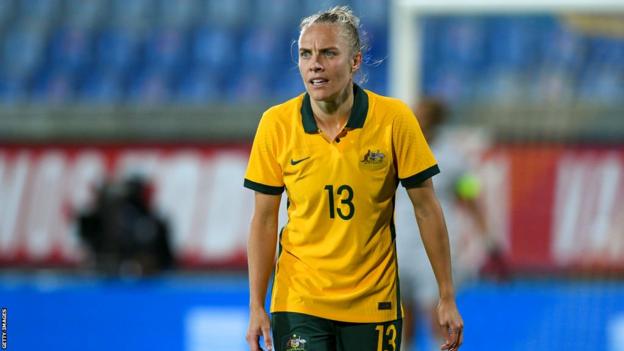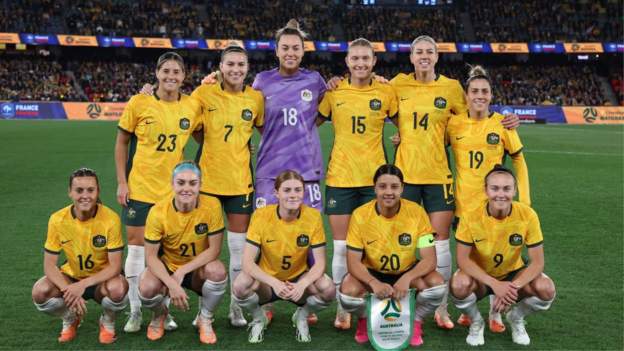
Australia’s squad have criticised the gender disparity in World Cup prize money and some nations not having collective bargaining rights.
All 23 Matildas players featured in a video posted by the Australian professional players union (PFA) three days before the tournament starts.
The squad also called for all of Australia’s women’s A-League players to become fully professional.
Australia are co-hosting the Women’s World Cup with New Zealand.
“736 footballers have the honour of representing their countries on the biggest stage this tournament,” said Australia and Everton’s Clare Wheeler in the video.
Western Sydney Wanderers’ Clare Hunt added: “Yet many are still denied the basic right to organise and collectively bargain.”
Brann midfielder Tameka Yallop said: “Collective bargaining has allowed us to ensure we now get the same conditions as the Socceroos, with one exception: Fifa will still only offer women one-quarter as much prize money as men for the same achievement.”
The total prize pot for the Women’s World Cup, which starts on Thursday, is $110m (£84.1m), a 300% increase from the 2019 tournament, but less than the $440m (£336.4m) pot for the men at the 2022 Qatar event.
The women’s A-League’s minimum wage for players increased from $16,344 (£8,509) to $20,608 (£10,730) in the 2022-23 season and is set to rise again in the 2023-24 campaign to $25,000 (£13,011).
The league includes 12 teams with a regular season from November to April. The top four teams then play in semi-finals and then a final to determine the champion.
Sydney FC’s Cortnee Vine added in the video: “Our sisters in the A-League Women are still pushing to make football a full-time career, so they don’t have to work part-time jobs like we had to.”
The BBC has approached the A-League for comment.
Football Australia CEO James Johnson said of the video’s release: “We were aware of the video going out. [But] we weren’t concerned as Football Australia at all because we know that our program is world leading and we know the PFA and the players agree with that as well.
“Fifa-wise, [the increase in money] doesn’t get to where I think we are in Australia, but it’s improved, there’s room for improvement.”
Speaking at the Fifa Congress in March, Fifa president Gianni Infantino said: “Our ambition is to have equality in payments for the 2026 men’s and 2027 women’s World Cup. This is the objective that we set to ourselves. Fifa is stepping up with actions, not just with words.”
Football’s governing body have also said their “ultimate aspiration” is for equal prize money and “we are on that journey”.
Equal pay has been established in cricket with the International Cricket Council announcing the milestone on 13 July.
The Matildas exercised their collective bargaining rights in an agreement in 2019 which gave them the same minimum percentage of tournament prize money as the nation’s men’s team.
This came after the women’s team took strike action in 2015 for better pay.
Australia are not the only team to speak out on equal pay with England in a bonus dispute with the Football Association. The governing body have reportedly said they will not pay Lioness players performance-based bonuses, with England defender Lucy Bronze calling the situation “frustrating”.
The Matildas’ video echoed the Karen Carney report, with the former England international saying the women’s game could be a “billion pound industry”.
Carney added professionalising the game and raising standards is the “biggest issue” in the sport.








More Stories
Kerr’s skill ‘made the boys cry’
Tufnell predicts Australia win on final day of Ashes
No hope of survivors from MRH-90 helicopter crash in Australia